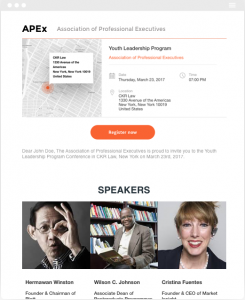
Planning a large-scale event can be both stressful and daunting. Not only do you have to focus on event promotion, but you also have to account for possible hiccups on the day of execution. Here are 6 effective guidelines that you can follow in order to make sure that your event runs smoothly and has high turnout rates:
1. Define what makes your event unique
The core of your event marketing should be a value proposition or a unique selling point. If you can concisely pinpoint the reason that your event is special and worth attending in a sentence or two, people won't want to miss it. In order to find your value proposition, you need to be able to understand the audience you're trying to target and why this event is important to them.
2. Create an attractive online event page
Don't give your attendees a reason not to attend your event. Include all relevant details about your event, including where, when, how, and what, in one centralized location. In order to inform and attract prospective customers, your event description should be attention-grabbing, clear, and concise. Lastly, ensure that your registration process is simple and easy to understand in order to increase attendance rates.

3. Use effective email marketing
In a recent survey, Eventbrite and Hubspot found that 58% of event marketers felt email was their most successful promotional channel. Harness the power of email for your marketing campaigns by personalizing your email marketing. You can do this by greeting guests directly with their name or segmenting your email list into smaller sections. This way, you can include specific relevant information that speaks to each group. The goal is to create productive and engaging emails that will attract more attendees.

4. Send reminders to registrants to ensure attendance
The key to a high turn-out rate is repeated reminders. Registrants often will RSVP to an event but ultimately choose not to attend because they were not prompted more than once. Sending email reminders or calling key event speakers and registrants several times in the coming weeks before the event will give them the incentive to follow through. Sometimes all a prospective attendee needs is a friendly reminder of your upcoming event.
5. Over invite
There is no way to control or guarantee how many people will turn up. Therefore, in order to accurately gauge your expected turnout, you should assume that 10-15% would not come. Over-inviting is a good way to ensure good attendance.
6. Public Relations Marketing
Capture potential attendees through various media channels, such as your local TV viewing audience or web outlets. Gain media coverage and increase your company's exposure by creating a news release for media and industry websites. An attractive media release pitch is an effective way to attract people to your event.
Executing your successful event
Keeping these six useful tips in mind, you will be able to effectively attract your potential attendees, achieve a maximum turnout rate, and build a favorable and lasting impression of your company's brand on your target audience.
Want to take advantage of mobile marketing at your successful event? Check out these 10 things to have on your event planning checklist.



